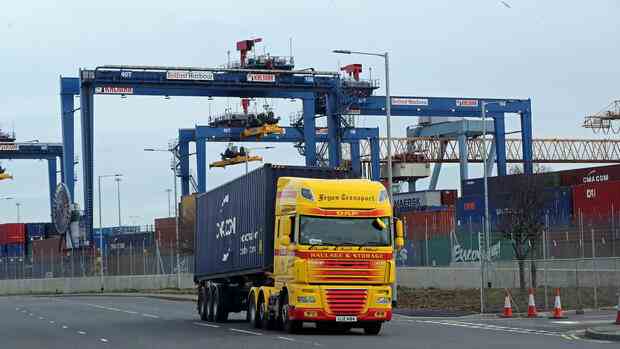London/Brussels Progress is being made in the long-running dispute between Great Britain and the EU over post-Brexit trade relations with Northern Ireland. After a meeting between British Foreign Secretary James Cleverly and EU Vice President Maroš Šefčovič, the government in London spoke of a “cordial and constructive meeting”. The reason for the optimism is apparently a tentative agreement on the exchange of data on goods being shipped from Great Britain to Northern Ireland via the Irish Sea.
London and Brussels had agreed on the so-called “Northern Ireland Protocol” in the 2019 exit agreement. After that, the Northern Irish province effectively remains part of the EU internal market in order to avoid a politically sensitive customs border with the Republic of Ireland. However, the conservative government in London has been questioning the agreement since last year because it sees trade with Northern Ireland at risk and is under political pressure from the provincial Unionists, who are loyal to London.
The Democratic Unionist Party (DUP), the largest party of Northern Ireland’s Protestants, fears a gradual decoupling of Northern Ireland from the Kingdom and a reunification of Ireland.
“A crucial prerequisite for building trust”
In the past few months, the EU has already reduced the control effort for the movement of goods. However, that was not enough for the British, and they then discussed data exchange in order to achieve accelerated clearance (“express lane”) for goods that remain in Northern Ireland. London is now willing to share real-time information on the flow of goods into Northern Ireland with Brussels, and the EU is poised to use the UK data.
Top jobs of the day
Find the best jobs now and
be notified by email.
The computer system seems like a tweak between the big issues of Britain’s national sovereignty and the EU’s control of its own internal market. However, it repeatedly played an important role in the negotiations. The British had promised that the system would be operational from early 2022.
>> Also read here: Baerbock calls on London to give in in the Northern Ireland dispute
However, the British then didn’t seem to bother to set it up. Officials of the EU Commission interpreted this to mean that the then government under Boris Johnson was not interested in good cooperation. Accordingly, it seemed increasingly pointless to make any concessions to the British.
British Prime Minister Rishi Sunak wants a pragmatic solution
(Photo: AP)
Apparently that has now changed. Both sides noted that data-sharing is “vital to building trust and creating security, and providing a new basis for EU-UK talks.” Talks are due to resume in Brussels on January 16 will.
The change of government in London apparently also contributed to the change in mood. Neither Boris Johnson nor his successor Liz Truss were willing to seek a pragmatic solution to the Northern Ireland dispute. Truss even launched legislation in mid-2022 that would allow UK ministers to unilaterally repeal provisions of the Northern Ireland Protocol. Only since the current Prime Minister Rishi Sunak took over government business in October have there been signs of relaxation.
Big stumbling blocks remain
Although Sunak is officially threatening to break the treaty with Brussels if necessary, he is also trying to find a pragmatic solution to the conflict. “I want to fix this and I am working constructively with our European partners to do this, and I am confident that we can find a solution,” Sunak said shortly before Christmas.
>> Also read here: UK inflation hits highest level in 41 years
Another reason for the change of course is the changed geopolitical situation: the Russian war of aggression against Ukraine has brought the European democracies closer together. At the same time, US President Joe Biden is urging London to reach an agreement with the EU by the 25th anniversary of the peace agreement for Northern Ireland on Good Friday 2023.
Despite the progress, the Northern Ireland dispute is still a long way from a solution. One of the main points of contention is whether the European Court of Justice should retain jurisdiction over trade disputes with Northern Ireland. The British are against it, the EU is for it.
It is also questionable whether the Protestant unionists in Northern Ireland will agree to a compromise. So far they have blocked the formation of a government in the regional parliament in Belfast in protest against the Northern Ireland Protocol. And British Prime Minister Sunak still has to convince the hard-line Brexit supporters in his party of his pragmatic course towards Brussels.
More: The UK is missing its own targets for post-Brexit trade deals.
